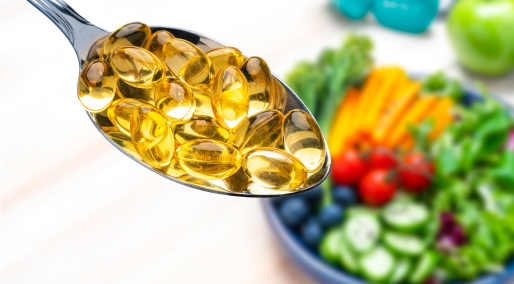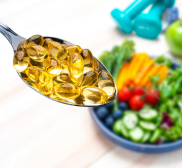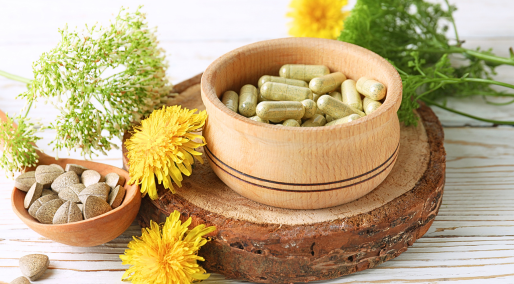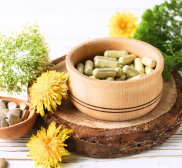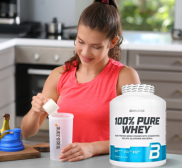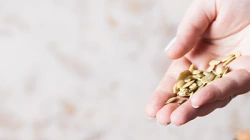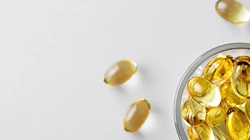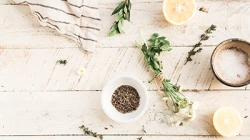.webp)
.webp)

Patryk Chodyniecki
Good HDL cholesterol
When you think about cholesterol, you may remember information from advertisements about "bad" cholesterol. or high cholesterol. However, there is also a "good" the type your body needs. It is called high-density lipoprotein (HDL) cholesterol. Bad cholesterol has a degrading effect on our body, while good HDL cholesterol is good for it. We must remember that good and bad cholesterol exist in our body, and their improper levels can cause hypertension, hypothyroidism, myocardial infarction and many other serious complications. Read the article below to learn more about HDL and what foods you should eat to raise its ratio to total cholesterol.
What is HDL?
This is the good kind of cholesterol, the kind you usually need.
It is worth adding here that HDL, LDL and triglycerides – a type of fat carried in the blood — they contribute to the overall, total cholesterol level in the body.
The first one is like a vacuum cleaner for cholesterol in the body. When it is at the appropriate level in the blood, it removes the excess of the other two above-mentioned and accumulated plaques in the arteries, and then sends it to the liver, which excretes it from your body. This helps reduce the risk of heart disease, heart attack and stroke.
What are the optimal cholesterol levels
The American Heart Association recommends having a blood test for cholesterol levels before the age of 20. It's a good idea to talk to a specialist about even getting tested earlier if you're at risk of heart disease, being overweight or obese.
Doctors measure cholesterol levels in milligrams/deciliter (mg/dl). Below is a breakdown of what your HDL results may mean.
|
HDL level |
Men |
Women |
Children |
|
Good |
40 mg/dl or more |
50 mg/dl or more |
45 mg/dl or more |
|
High |
60 mg/dl or more |
60 mg/dl or more |
200 mg/dl or more |
|
Low |
less than 40 mg/dl |
less than 50 mg/dl |
not applicable |
Foods that increase cholesterol
A bagel with cottage cheese for breakfast, a piece of fried chicken for lunch, and a bowl of ice cream at night are not ideal for managing healthy cholesterol levels. These are sources of saturated and trans fats. They can increase LDL and total cholesterol levels.
How does food affect cholesterol?
A bagel with cottage cheese for breakfast, a piece of fried chicken for lunch, and a bowl of ice cream at night are not ideal for managing healthy cholesterol levels. These are sources of saturated and trans fats. They can increase LDL and total cholesterol levels.
How does food affect cholesterol?
The things that increase HDL are actually not food, but several medical and environmental factors occurring simultaneously. Avoid the following factors to increase your HDL levels:
-
obesity,
-
sedentary lifestyle,
-
type 2 diabetes,
-
hepatitis,
-
smoking.
Some hormones, such as estrogen or thyroid hormone, increase good cholesterol. As specialist studies have shown, exercise and limited alcohol consumption are also very helpful on the way to a healthy body.
Appropriate dietary choices can lower LDL levels, which improves the HDL to LDL ratio.
If you are wondering how you should eat, the Mediterranean diet may be a good start to reducing bad cholesterol levels. Scientists have shown that in people with risk factors for metabolic diseases, following this type of food effectively lowered overall blood levels.
Olive oil
According to research published in 2019, the type of heart-healthy fat found in olives and olive oil can lower the effects of LDL cholesterol on the body.
Use extra virgin olive oil instead of other oils and fats when cooking and frying at low or moderate temperatures because it breaks down best at high temperatures. You can also use it in salad dressings, sauces and to season dishes right after cooking.
However, it is worth remembering to use olive oil in moderation because it is high in calories. The United States Department of Agriculture defines one tablespoon of extra virgin olive oil in one serving of food as healthy.
Whole grain products
Bran, cereals and brown or wild rice can lower LDL and total cholesterol levels. This, in turn, provides a percentage increase in HDL levels. This is because these foods contain fiber — especially soluble fiber, which helps reduce levels of bad fat.
Eat at least two servings of whole grains a day. It can be as simple as a bowl of oatmeal for breakfast, 100 percent whole wheat bread for lunch, and a serving of brown rice for dinner.
Beans and legumes
Like whole grains, beans and legumes are excellent sources of soluble fiber. You can try black beans, black peas, navy beans, lentils and more. They're great as side dishes, snacks like Cajun Corn and Bean Salad, or in soup like Italian White Bean and Kale Soup. You can also try spicy black bean chili as a light dinner for the whole family, even during the week when there is no time for sophisticated cooking.
Fruits with high fiber content
Eating fruits with lots of fiber, such as prunes, apples and pears, may help. Chop them up and mix them with cereal or oatmeal, throw them into a blender and create a delicious smoothie. They are equally great as an afternoon snack or right after dinner.
Oily fish and animal fats
Omega-3 fatty acids found in fish may lower LDL levels. Look for the best quality options in a proven store, such as:
-
salmon,
-
mackerel,
-
tuna,
-
sardines,
-
rainbow trout.
Lin
Ground flaxseed and oil also contain omega-3 fatty acids. Many vegetarians use them as a source of these macronutrients because they are one of the better plant sources of this heart-healthy fat.
Be sure to buy ground flax seeds, as whole flax seeds are almost impossible for the human body to digest. This means they pass through your body largely intact and leave no nutrients behind.
Ground linseed can be sprinkled on morning cereals, oatmeal, salads, poured over dips or yogurt, and added to baked goods. Flaxseed oil is a welcome addition to salad dressings or smoothies.
Nuts
Nuts, including Brazil nuts, almonds, pistachios, and peanuts, which are technically legumes, are rich in heart-healthy fats. They are also high in fiber and contain a substance called plant sterols, which block the body's absorption of cholesterol.
Just remember that if you are watching your calories, control your nut portions with a measuring cup or scale as they are high in calories.
Chia seeds
Chia seeds are a source of plant-based omega-3 fatty acids, fiber and other healthy nutrients. Adding chia seeds to your diet can help lower LDL levels and blood pressure. Like linseed, they are great for enriching cereals, oatmeal, dips, salads, yogurts or cocktails.
Unlike linseeds, chia seeds can have a slightly slippery consistency because they are moist in their own right. If this is a problem for you, try eating the seeds by adding them to baked goods instead of eggs.
Nowadays, due to their growing popularity, they are available en masse in many different food products in supermarkets.
Avocado
Avocados contain folic acid and monounsaturated fats. This healthy type of fat helps maintain HDL levels and reduces the risk of stroke, heart attack and heart disease. They are also filled with fiber, which naturally helps control cholesterol levels.
Add avocado slices to salads, soup, chili or sandwiches. Guacamole is also a great option. remember to reach for low-calorie foods as side dishes, such as carrots, radishes and tomatoes, instead of high-calorie and salty tortilla chips.
Soy
Soy-based products are not only for vegetarians. Including this food in your diet is a great way to reduce bad cholesterol levels. People who eat less meat will likely lower their LDL levels and therefore increase their HDL levels. Firm tofu is usually very pleasant to grill, and the recipe for a vegetable tofu kebab will please even your meat-loving friends.
Lifestyle
Eating the right foods can lower your bad cholesterol and improve your good cholesterol, but that's not the only thing you can do to achieve your desired levels. Here are some other steps you can take:
Physical activity
Daily exercise is important for overall health and can significantly reduce bad cholesterol levels. The Centers for Disease Control and Prevention (CDC) recommends that adults engage in at least 2.5 hours of moderate-vigorous physical activity per week.
Diet and weight
Changes to your diet and increasing your activity level can help you achieve and maintain your optimal weight. In some cases, reducing excess weight will increase the percentage of HDL and at the same time reduce the ratio of bad cholesterol.
Genetics
Sometimes, despite your best efforts, you may still have trouble maintaining healthy cholesterol levels. Genetics can play a significant role in this, so talk to your doctor about your personal risks and what you can do to address them.
Digestive system
Your gut flora, or microbiome, influences your cholesterol levels and your risk of heart disease. It may be helpful to add probiotic-rich foods to your daily diet, such as yogurt and fermented foods.
Cholesterol medications
In addition to lifestyle and diet changes, your doctor may prescribe medications that will help lower your cholesterol levels.
Some of the most common medications used to treat high cholesterol include:
-
Statins - reduce the production of cholesterol in the liver. This lowers LDL levels but only slightly increases HDL
levels -
Ezetimibe - these drugs reduce the amount of fat absorbed by the intestines. They may have a moderate effect on the good type of cholesterol.
-
Fibrates - help reduce the level of triglycerides (a type of fat) and increase the percentage of HDL.
-
Niacin - Doctors prescribe these medications to lower LDL and triglyceride levels and increase HDL levels.
Doctors usually also prescribe biologics if statins and dietary changes don't help. This new type of treatment may prove expensive, but effective.
Summary
Before you start radically changing your diet or taking any supplements, talk to your doctor. Remember that food is the first, completely natural way to provide the body with heart-healthy vitamins, minerals and nutrients. However, it is worth adding that some foods and supplements are less healthy due to their possible interactions with medications or prescriptions, so consultation with a specialist may be necessary. Total cholesterol must be normal. If you want to lower your cholesterol because you suffer from high cholesterol, start with a proper diet. Cigarette smoking, alcohol, bad fats can lead to coronary heart disease, circulatory system diseases, atherosclerotic plaques and many others.
Get discount:
www.mayoclinic.org/diseases-conditions/high-blood-cholesterol/in-depth/hdl-cholesterol/art-20046388
www.cdc.gov/cholesterol/ldl_hdl.htm
www.webmd.com/cholesterol-management/guide/hdl-cholesterol-the-good-cholesterol
www.labtestsonline.pl/test/hdl-cholesterol
Rate the text

Patryk Chodyniecki








.png)
